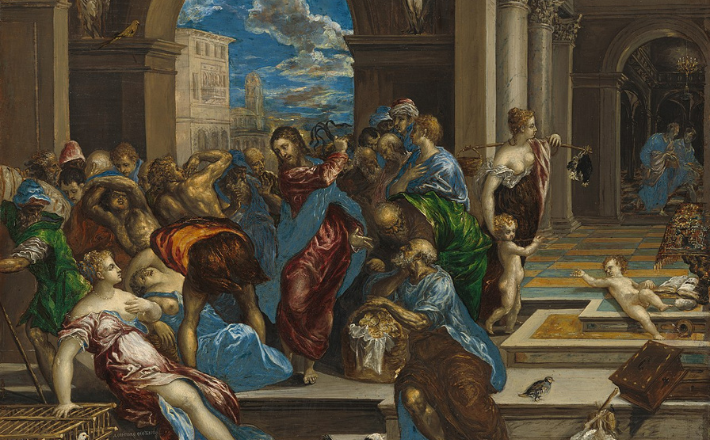Commentary on Psalm 19
Psalm 19 is a rich gift. From Beethoven’s “The Heavens Are Declaring” (Die Himmel rühmen), to Bach, Handel, and Haydn, magnificent musical compositions have incorporated its words. C.S. Lewis declared that Psalm 19 was a treasure trove in the Psalter, writing, “I take this to be the greatest poem in the Psalter and one of the greatest lyrics in the world.”1 On this Third Sunday in Lent, how do we read and appropriate this psalm into our Lenten journey?
Psalm 19 is one of five psalms in the Psalter categorized as a creation psalm. The others are Psalms 8, 65, 104, and 148. As an interesting aside, one commentator imagines that while Psalm 8 was composed while contemplating the star-filled night sky, Psalm 19 was composed in the bright light of day when the sun eclipses the starry night sky. Nevertheless, Psalm 19 is unique among all the creation psalms in that, while creation is celebrated in the first six verses of the psalm, the remaining verses, 7–14, focus on the torah, the instruction, of God.
We begin with an examination of the two elements of the psalm, broken into four sections. Verses 1–4a celebrate creation’s delight in God’s good provisions. No words are necessary, but creation, in deafening silence, shouts its delight in God’s creative provisions. Every time I read this portion of the psalm, I am reminded of Elijah’s encounter with God in 1 Kings 19:11–12 after he flees from Jezebel. There we read that God says to Elijah,
“Go out and stand on the mountain before the LORD, for the LORD is about to pass by.” Now there was a great wind … but the LORD was not in the wind; and after the wind an earthquake, but the LORD was not in the earthquake; and after the earthquake a fire, but the LORD was not in the fire; and after the fire a sound of sheer silence.
(Many of us learned it as “a still, small voice,” but “sheer silence” is actually a better translation of the Hebrew). Sometimes, we have to stand in the magnificent quiet of nature to hear the voice of God, something perhaps more important in this Lenten season than in other times.
Verses 4b–6 echo the common ancient Near Eastern picture of the earth in relationship to the created order. There we read that the sun emerges from its tent and runs its course across the sky … but we read in verse 4b that the creator God is the one who has set the tent for the sun. The sun is not a god, as depicted in other ancient Near Eastern stories, but is part of God’s creation (see Genesis 1:14–17).
Thus verses 1–6 of Psalm 19 paint a picture of a world that celebrates day after day the wondrous creative work of God. And humans are not mentioned once—a humbling reminder of our place within the greater created order.
The focus of the psalm changes dramatically beginning with verse 7. Now, not creation, but the torah is center-stage.
Verses 7–10 extol the virtues of the torah, using synonyms for torah that echo Psalm 119’s extended praise of torah—decrees, precepts, commandments, and ordinances. Verses 11–13 recount the psalmist’s self-admonition to pay attention to the silent voices of creation and to cling to the teachings of the torah—God’s creative and redeeming work—and ask God to keep the psalmist from “the insolent” (verse 13 New Revised Standard Version Updated Edition) (variously translated as “proud thoughts,” “arrogance,” or “presumptuous sins”). While “the insolent” is an apt translation of the Hebrew word, the NRSVue includes a footnote offering an alternate translation of “proud thoughts.”
A translation of “the insolent” can imply outside influences on the psalmist, while “proud thoughts” internalizes the influence to the psalmist’s own self—a better understanding, perhaps, of the psalmist’s “gut feelings” after musing on creation and the torah. Interestingly, the same Hebrew word translated as “the insolent” in Psalm 19:14 occurs six times in Psalm 119, the lengthy psalm celebrating the torah (verses 21, 51, 69, 78, 85, 122). While in Psalm 119:21, the word is translated as “insolent” and in verse 112 as “godless,” in the other four occurrences in Psalm 119, the New Revised Standard Version translates the word as “arrogant.”
The final words of the psalm, “Let the words of my mouth and the meditation of my heart … ,” are fitting for those of us who endeavor to bring the words of scripture alive to our listeners. Psalm 19 summarizes magnificently the two ways in which God engages the world according to the biblical text—through creation (Genesis 1–3; Psalms 8 and 104; Isaiah 42:5; John 1:1–3, and others)—and through active engagement with the people of God—the call of Abraham and Sarah (Genesis 12); the exodus from Egypt (Exodus 12); the giving of the torah at Sinai (Exodus 20); the ongoing appeal to faithfulness through the prophets; and the birth, life, and teachings of Jesus of Nazareth.
As we journey through this Lenten season, filled with introspection and anticipation of the death and resurrection of Jesus, may we take the time to stop, if only briefly, and listen to the silent voice of creation, and then to reflect on the torah, the blueprint for living in community with one another. Psalm 19 is a wonderful summary of both of those iterations of the God we worship.
Notes
- C.S. Lewis, Reflections on the Psalms (New York: Harcourt, Brace, 1986), 63.



March 3, 2024